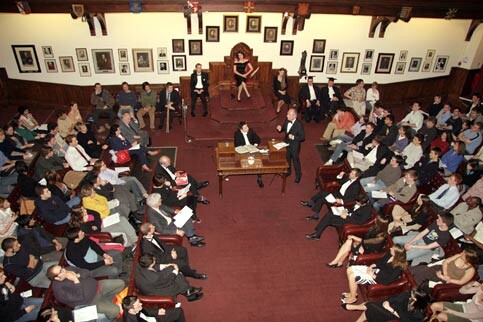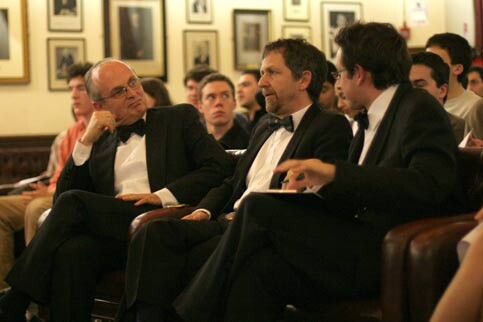The Electronic Intifada 20 February 2006

The debate “This House Believes that Zionism is a danger to the Jewish people” was scheduled to be held at Cambridge University on February 16. (Photo: Andy Sims)
In a full chamber, the Cambridge Union last Thursday hosted the motion ‘This House believes that Zionism is a danger to the Jewish people”, an event labelled a “Jewish blood sport” by participant Ned Temko. The motion, which was carried by a small margin, was a good chance for Zionist apologists and their critics to showcase the best of their arguments.
Brian Klug, speaking in favour of the motion alongside Israeli journalist Daphna Baram and Chair of Jews for Justice for Palestinians Richard Kuper, opened the proceedings. One of the recurrent themes of the evening were the repeated attempts to specify what this debate was not, with Klug pointing out that specific historical narratives, or potential future solutions, were not on the agenda. Later, Baram went further, stressing that the motion was not about the ‘right’ of Israel to exist as a state - but rather about the character of the state.
A core element of the proposition’s case was that, in the words of Baram, even if “Zionism does not have a meaning without Israel, Israel may well have meaning without Zionism”. This was a distinction that somewhat eluded the opposition, who repeatedly attempted to make the debate about Israel’s ‘legitimacy’: in the words of BICOM head Daniel Shek, the motion should read “Israel is a danger to the Jewish people”, since Zionism and Israel are apparently inseparable.
This strategy, of eliding Zionism, Israel, and Judaism, was one repeatedly attacked by proposition speakers Dr Klug, and Richard Kuper. Klug contrasted Judaism’s historical richness with Zionism’s more recent emergence, pointing out that “idolatry” is the setting up of something finite and treating it as something sacred. It was thus high time for “Zionism must be toppled from its pedestal” - the “Jewish thing” to do is to “subvert” it. Kuper pointed out that blurring the lines between Zionism and Judaism plays straight into the hands of anti-Semites who do not distinguish between the two either.
Rather than merely lamenting the logic of the opposing side, Klug and Baram in particular were keen to point out that an alternative reality for the state of Israel was eminently possible, namely, “normalising” the state’s relationship with its non-Jewish citizens, and “removing the privileges afforded to Jews”. These policies, incompatible with a modern democracy, remain according to Klug because of an “ideology that ties Israel to Jewish identity”, a “big, bad idea that is riding the state to ruin”.

Featured speakers are Daphna Baram, Dr. Brian Klug, Daniel Shek, Richard Kuper, Ned Temko and Jeremy Brier. (Photo: Andy Sims)
Baram urged a process of ‘dezionisation’, whereby Israel becomes a state for all its citizens, not worldwide Jewry. Kuper, for his part, chose not to stress the ideological underpinnings of Israel, but rather its policies as regards the Palestinians of the Occupied Territories. He decried the stifling effect of Zionism on debate, and the frequency with which the accusation of ‘anti-Semitism’ is thrown around.
Speaking against the motion alongside Danny Shek of BICOM were Observer correspondent Ned Temko and former Cambridge Union president, Jeremy Brier. The main points put forward by the opposition boiled down to three key elements: Zionism is the ‘right’ of Jews to self-determination, the context of “Jewish suffering” and the Holocaust, and the question as to why Israel is singled out for attack.
Shek in particular challenged the audience to think if any other state in the world would have to justify itself, or defend its legitimacy in the same way as Israel, while concluding his plea with the hope that the audience, when voting, would recall all his relatives who died in the Holocaust and ask if they would have thought Israel a ‘danger’ to the Jewish people.
All the opposition speakers were keen to state that no one objected to criticism of Israel’s policies (though none of them went ahead and criticised them), but that there was a “slippery slope” to questioning Israel’s right to exist. This issue of Israel’s legitimacy was repeatedly made the focus of the debate, despite the actual framing of the motion. Temko ascribed the “projection” of personal “angst” to Daphna Baram and Dr Klug, for their concerns over Zionism, while Briers was brought on at the end to launch a speech of bluster yet little substance.
Briers’ contribution was more an attempt to respond piecemeal to the proposition, but by the end, amounted to a declaration that the Jewish people have been the “most persecuted” in the world, and therefore deserved their right to a state of their own. It was left to one lone question from the audience to raise the issue of what ‘Jewish self-determination’ in Palestine entailed for the Palestinians themselves, a query that produced applause from the audience, but silence from the speakers.
Ben White is a freelance journalist and writer. He haswritten for a variety of publications on Palestine, including ‘Middle East International’, ‘Palestine Chronicle’, ‘Washington Report on Middle East Affairs’, and ‘New Statesman’. All articles can be viewed on his website and his blog.
Notes
Related Links




